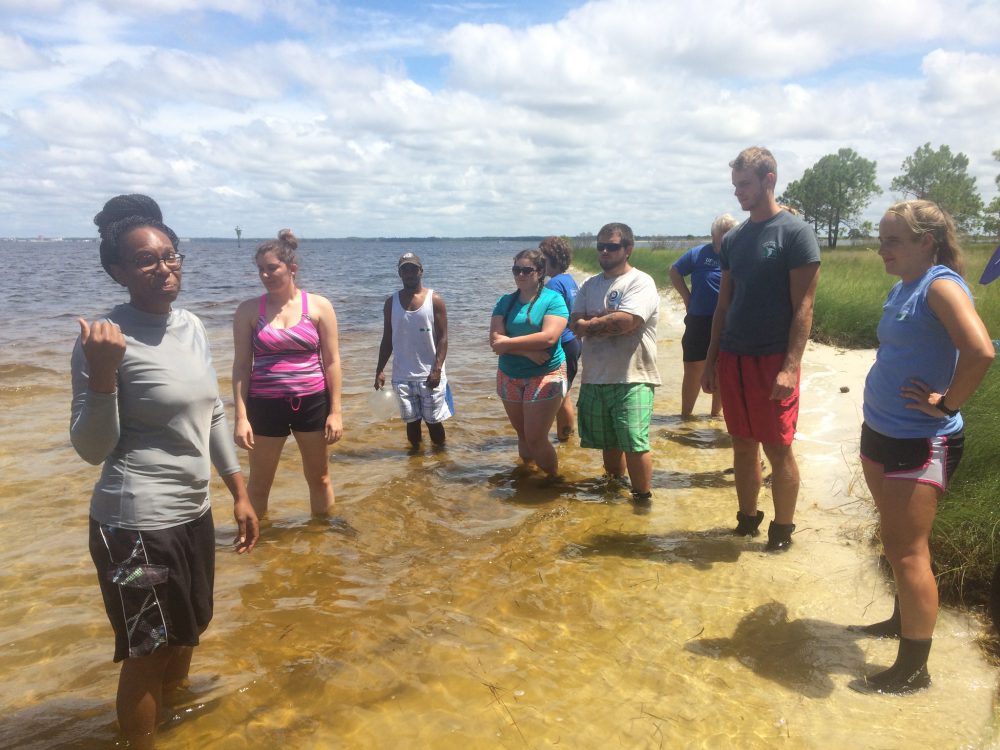
by Laura Tiu | Mar 31, 2017
By: Laura Tiu and Sheila Dunning
For the second year in a row, University of Florida Extension Agents Sheila Dunning (horticulture) and Laura Tiu (marine science) taught a Florida Master Naturalist Program (FMNP) Coastal Module to a newly recruited AmeriCorps group in Okaloosa and Walton counties. The AmeriCorps members have been recruited to work with local the non-profit Choctawhatchee Basin Alliance during the 2016-17 school year teaching Grasses in Classes and Dunes and Schools at the local elementary schools.
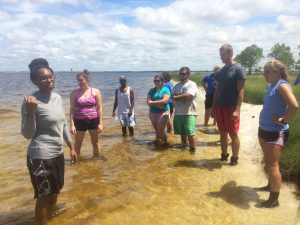
AmeriCorp volunteers learning about coastal environments by attending the Florida Master Naturalist class.
Photo: Laura Tiu
As part of the training, FMNP students participated in an aquatic species collection training to enable them to collect species for touch tanks used throughout the school year. At the training, we met two Fort Walton Beach High School science teachers. Teachers Marcia Holman and Ashley Daniels (an AmeriCorps 2013 member herself) were surprised to see two former students in our AmeriCorps 2016 FMNP class; Dylan and Kaitlyn. Dylan, they reported, was a student that many teachers worried about during his freshman year. However, he just blossomed because of his involvement in the marine classes and environmental ecology club. They were most proud of his leadership designing and implementing a no-balloon graduation ceremony. This prevented the release of potentially harmful balloons into our coastal waterways where they pose a hazard to marine life.
The teachers were so happy to see both students had joined AmeriCorps and were receiving FMNP training. They realized that they were making a difference in the lives of their students and the students they had trained were working to preserve and protect the environment in their communities. When asked if they had any other students that we need to be prepared for Holman replied, “It’s hard to tell at this point in the year if we have any rising marine science stars, but we did have 20 kids show up for the first meeting of the ecology kids club.” We can’t wait to meet them.
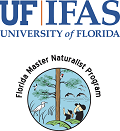
by Chris Verlinde | Jan 19, 2016
 The mission of the Florida Master Naturalist program (FMNP) is to promote awareness, understanding and respect of Florida’s natural environment. FMNP graduates, Paul Bennett and Charlie Lurton have both worked diligently through the permitting process to place living shorelines consisting of oyster shell bags and marsh plants along their coastal properties.
The mission of the Florida Master Naturalist program (FMNP) is to promote awareness, understanding and respect of Florida’s natural environment. FMNP graduates, Paul Bennett and Charlie Lurton have both worked diligently through the permitting process to place living shorelines consisting of oyster shell bags and marsh plants along their coastal properties.
Living Shorelines incorporate a range of natural structures to protect coastal shorelines from erosion and enhance habitat for wildlife. Oyster shell bags, biologs, plants and sand fill may be used or a combination of natural materials may be used in a living shoreline project. These projects provide “soft” shoreline protection that offers economic and ecological benefits to the property owner. They are recommended for use in low wave and erosional settings.
In higher wave energy areas, seawalls and bulkheads may be required for shoreline protection. These types of projects “harden” the shoreline, and do not allow for intertidal habitat and eliminate the natural slope of the shoreline. Hard structure projects can have a detrimental effect on nearby properties as wave energy is deflected from the structure and can increase erosion nearby, alter sand movement and decrease intertidal habitat.
Both Mr. Bennet and Mr. Lurton realized the importance and benefits of shoreline protection using natural materials, both men attributed this knowledge to their experiences in the FMNP. The FMNP graduates worked with the local branch of the Florida Department of Environmental Protection’s (DEP) Florida Coastal Office, Northwest Florida Aquatic Preserves, to obtain funding and permits for the projects. DEP’s Florida Coastal Office has worked with the US Fish and Wildlife Services’ Coastal Program to promote and support living shoreline projects across the Panhandle.
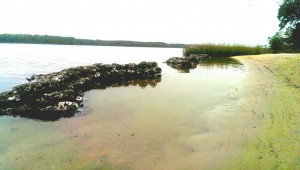
Oyster reef breakwater along the Shoreline of Bayou Grande, Charlie Lurton’s project. Photo credit: Zachary Shang
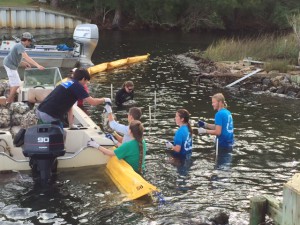
Installing the oyster reef breakwater along the shoreline of Paul Bennett in East Bay, Santa Rosa County, FL. Photo Credit: Beth Fugate
Mr. Lurton worked with seven of his neighbors to create 1,200 linear feet of shoreline. This project on Bayou Grande in Escambia County incorporated 39 oyster reefs, each built of 200 bags of recycled oyster shells. Each bag of recycled oyster shell weighs approximately twenty pounds for a total of 78 tons of shell! 11,300 native grasses and salt tolerant plants will be installed along the shoreline this year.
Mr. Bennet’s project along East Bay in Santa Rosa County consists of 5 reefs built along the mouth of a freshwater marsh located on his property for a total of 10 tons of shell. DEP’s Florida Coastal Office will determine if native grasses and plants are needed for the project in the future.
“The conversation for both of these projects started years before we were able install any materials so it’s rewarding to see them take hold,” said Zachary Schang, environmental specialist with the Northwest Florida Aquatic Preserves. “It was in large part due to the persistence of the property owners who wanted to deal with a natural problem using a natural solution.”
These types of habitat restoration projects allow for ecological and economic benefits for the property owners. The Fl. Master Naturalist Program promotes understanding and awareness of natural resources, these two graduates have demonstrated what it means to be a FMN.
Watch this newsletter for more about the FMNP and FMNP graduates. For more information about the FMNP and classes being offered in your area, check out http://www.masternaturalist.ifas.ufl.edu/.





